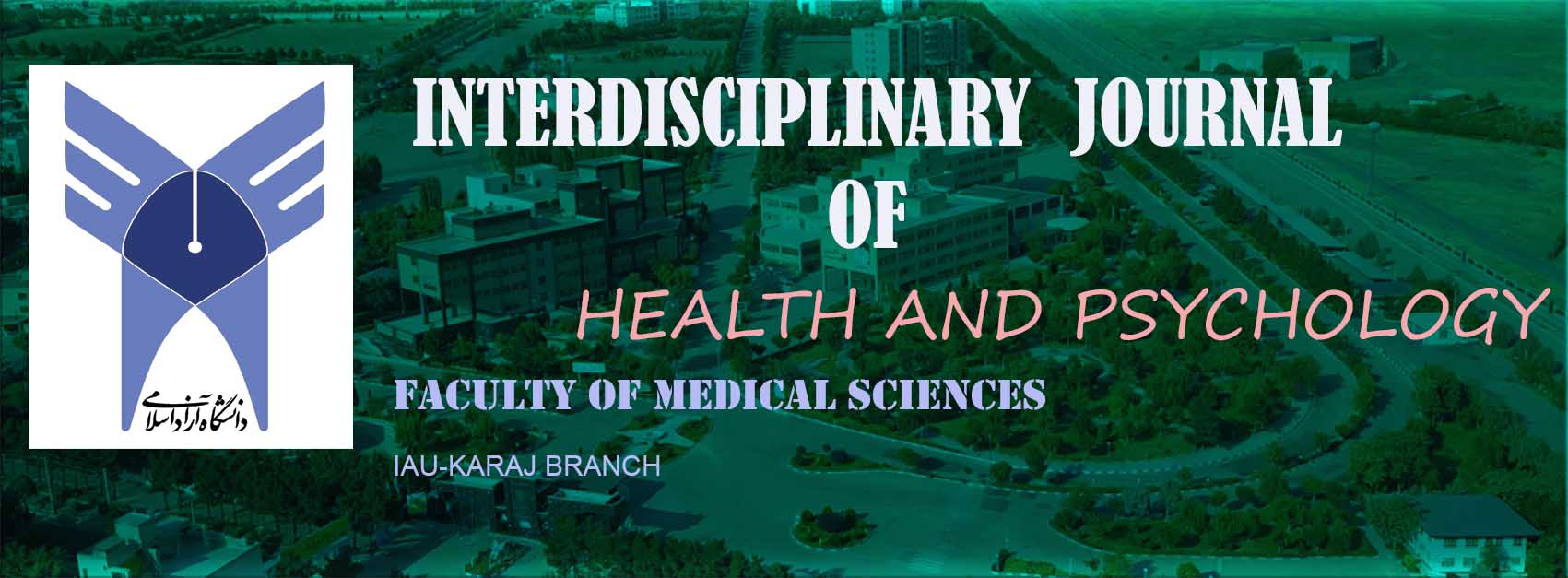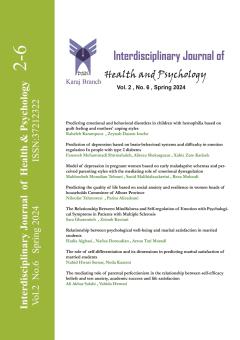The role of self-differentiation and its dimensions in predicting marital satisfaction of married students.(Authors: Nahid Hwasi Somar / Neda Kazemi)
Subject Areas : Psychology of wellbeing
Keywords: self-differentiation, marital satisfaction, student,
Abstract :
Abstract This research was conducted with the aim of predicting marital satisfaction in married students based on self-differentiation and its dimensions. The research was descriptive-cross-sectional and correlational. All married students studying at Islamic Azad University, Karaj branch in 1401 constituted the statistical population of the research, among them using the available sampling method and according to the formula for determining the sample size of the plant (n=50+8m). 150 people were selected. In addition to the demographic information checklist, a researcher-made form was used to collect data with his differentiation questionnaire (Skorn and Smith, 2003) and the Enrich Marital Satisfaction Questionnaire (Olson et al., 1997). Data analysis was done with descriptive statistics methods (frequency, percentage, mean and standard deviation), statistical assumptions test, Pearson correlation coefficient and multiple regression with SPSS-v26. The findings showed that there is a positive and significant correlation between the total score of self-differentiation (r=0.632 and P<0.05) and each of its components with the marital satisfaction of married students. Also, the coefficients of the regression analysis showed that among the components of their differentiation, the component of my position had the highest power in explaining the variance of the marital satisfaction score (β=0.139).
منابع
آریاییآذر، ا.، صادقی، م و موتابی، ف. (1400). بررسی تمایزیافتگی زوجین از خانواده اصلی و نقش آن در پیش بینی الگوهای ارتباطی و رضایت زناشویی در قومیت های مختلف ایران. مجله خانواده پژوهی، 17(67)، 368-353.
اعظمی، ز. (1400). پیش بینی کیفیت زندگی براساس رضایت زناشویی، سن ازدواج، الگوهای همسر گزینی و تفاوت سنی زوجین شهر ماهشهر. مجله پیشرفت های نوین در روان شناسی، علوم تربیتی و آموزش و پرورش، 4(40)، 116-99.
بهروزنیا، ه و جعفری، ا. (1400). پیش بینی کیفیت زندگی زناشویی براساس تمایزیافتگی خود و تحمل ناکامی در زنان شاغل در بخش پرستاری. فصلنامه پژوهش های کاربردی در علوم رفتاری، 13(48)، 84- 61.
ترابی، ن.، وکیلی، پ و فتاحی اندبیل، ا. (1400). ارائه مدل علی در تبیین بین تمایزیافتگی خود و بخشودگی با رضایت زناشویی با نقش میانجی گر جهت گیری مذهبی. مجله پژوهش های مشاوره، 20(78)، 107-80.
تابش، س.، بهرامی، ه و رضازاده، م. (1400). طراحی نیمرخ پیش بینی کننده رضایت زناشویی زوجین شهر تهران. مجله مطالعات روانشناسی بالینی، 12(45)، 112-77.
رضایی، م و رضایی، س. (1399). پیش بینی طلاق عاطفی براساس سبک دلبستگی، صمیمیت زناشویی و هوش هیجانی زوجین. مجله رهیافت های نوین در مطالعات اسلامی، 2(4)، 290-278.
رافضی، ز و صبوری، ر. (1401). نقش مولفه های تمایزیافتگی خود در پیش بینی صمیمیت زناشویی در زوجین. مجله فرهنگ مشاوره و روان درمانی، 13(51)، 205- 181.
رشید، خ.، دلفان بیرانوند، آ.، فتاحی، ک و مریانجیان، ح. (1400). پیش بینی کننده های رضایت زناشویی: مطالعه موردی کرمانشاه و همدان. نشریه اصول بهداشت روانی، 23(4)، 265- 251.
رجایی، م و حیدری، ح. (1396). بررسی رابطه بین اعتیاد به اینترنت با رضایت و دلزدگی زناشویی دانشجویان متأهل دانشگاه آزاداسلامی خمینی شهر. مجله سلامت جامعه، 11(1)، 77-70.
زارع گاریزی، م.، ابراهیمی مقدم، ح و ابوالمعالی الحسینی، خ. (1399). پیش بینی تعهد زناشویی براساس نیازهای بنیادین روانشناختی و صمیمیت با واسطه گری تمایزیافتگی خود. مجله روانشناسی کاربردی، 14(1)، 76-55.
سرخابی عبدالملکی، م.، دوکانه ای فرد، ف و بهبودی، م. (1400). الگوی ساختاری پیش بینی طلاق عاطفی زوجین براساس باور فراشناختی و راهبرد نظم جویی هیجانی با میانجی گری فرسودگی زناشویی در زنان متأهل. مجله خانواده درمانی کاربردی، 2(2)، 28-1.
سامانی، س. (1386). بررسی عمده ترین عوامل ایجادکننده درگیری زناشویی در گروهی از دانشجویان متأهل دانشگاه شیراز. مجله خانواده پژوهی، 3(11)، 668-657.
فلاح برنجستانکی، و.، صابری، ه و شمالی اسکویی، آ. (1401). مقایسه اثربخشی واقعیت درمانی گروهی با درمان شناختی-رفتاری گروهی بر رضایت زناشویی و خودکنترلی زنان. مجله روانشناسی کاربردی، 16(3)، 224-201.
عبدلآبادی، ح.، آهی، ق.، اصلذاکر، م.، شهابیزاده، ف و نصری، م. (1401). نقش میانجی خودتمایزیافتگی و تنظیم شناختی هیجان در ارتباط کیفیت روابط ابژه با الگوی تجربه روابط نزدیک در زوجین. مجله تحقیقات علوم رفتاری، 19(2)، 279- 267.
کاظمیان مقدم، ک.، مهرابی زاده هنرمند، م.، کیامنش، ع و حسینیان، س. (1397). رابطه علی تمایزیافتگی، معنای زندگی و بخشودگی با دلزدگی زناشویی از طریق میانجی گری تعارض و رضایت زناشویی. مجله روش ها و مدل های روانشناختی، 9(31)، 146- 131.
کرمی، م.، احمدی، ص و قبادی، س. (1400). پیش بینی رضایت زناشویی براساس شادکامی و کیفیت زندگی در زوجین شهر تهران. مجله روانشناسی کاربردی، 22(1)، 102-93.
لطفی سرجینی، ا.، تقی پور، ش.، میرصیفی فرد، ل و مرادی، خ. (1398). پیش بینی رضایت زناشویی براساس رضایت جنسی، تمایزیافتگی و تفکر قطعی نگر در بین زوجین جوان شهر اصفهان. مجله زن و مطالعات خانواده، 12(43)، 37-19.
مرادی، ز و کشاورز افشار، ح. (1400). کیفیت زندگی، رضایت زناشویی و صمیمیت زناشویی در بین کارکنان نیروی انتظامی. مجله روانشناسی نظامی، 12(47)، 44-27.
نصرزاده، ز و صداقتی فرد، م. (1400). پیش بینی رضایت مندی زناشویی براساس تمایزیافتگی خود و صمیمیت زوجین در دانشجویان متأهل. فصلنامه روانشناسی تحلیلی-شناختی، 12(44)، 55-41.
Finzi-Dottan, R. (2023). The Role of Fear of Intimacy as Mediator between Self-Differentiation and Marital Relationship Satisfaction: A Dyadic Model. The Family Journal, 31(3), 392-398.
Herrera, M. S., Elgueta, R., Fernández, M. B., Giacoman, C., Leal, D., Marshall, P., ... & Bustamante, F. (2021). A longitudinal study monitoring the quality of life in a national cohort of older adults in Chile before and during the COVID-19 outbreak. BMC geriatrics, 21(1), 1-12.
Kang, X., Lin, X., Zhang, K., Hui, Z., Xiang, W., He, J. Y., ... & Zuo, Z. (2023). NTIRE 2023 video colorization challenge. In Proceedings of the IEEE/CVF Conference on Computer Vision and Pattern Recognition (pp. 1570-1581).
Kong, J., Easton, S. D., & Zhang, Y. (2023). Sexual and marital satisfaction in older adulthood: Effects of childhood and adulthood violence exposure. The Gerontologist, 63(2), 285-296.
Lee, W. S., & Hong, S. U. (2022). A study on the Rasing-Anxiety of Parenting of children in school age with Low levels of Self-differentiation. Industry Promotion Research, 7(2), 31-42.
Mozas-Alonso, M., Oliver, J., & Berástegui, A. (2022). Differentiation of self and its relationship with marital satisfaction and parenting styles in a Spanish sample of adolescents’ parents. Plos one, 17(3), e0265436.
Paknejad, F., & Ahmadi, K. (2022). The comparison of the differentiation indices in Bowen's intergenerational theory with perceived differentiation indices in the community of Iranian parents resident in Tehran. Family Counseling and Psychotherapy, 7(1), 65-84.
Seneviratne, A., & Gay, N. (2023). Alcool, toi et moi, un ménage explosif. Les enjeux de différenciation de soi dans l’accompagnement des couples en alcoologie. Thérapie familiale, 44(1), 17-32.
Sommantico, M., Iorio, I., Lacatena, M., & Parrello, S. (2021). Adult attachment, differentiation of self, and relationship satisfaction in lesbians and gay men. Contemporary Family Therapy, 43(2), 154-164.
Tian, M. (2022, March). The Heroines’ Predicament of Self-differentiation in Celeste Ng’s Fictions. In 8th International Conference on Education, Language, Art and Inter-cultural Communication (ICELAIC 2021) (pp. 291-298). Atlantis Press.

